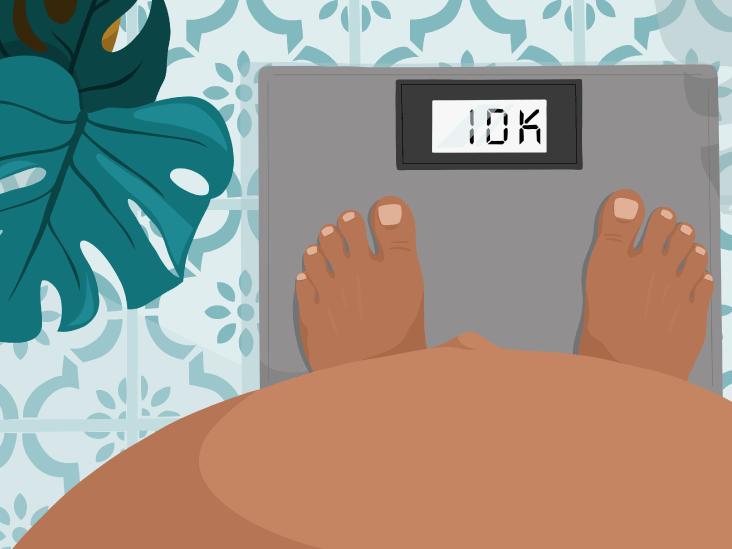Gaining weight during pregnancy is important for the growth and development of baby. Being underweight and pregnant is not a big concern as long as you are adding enough weight throughout your pregnancy especially in the second and third trimester.
Why am I not gaining weight during pregnancy?
There are many factors that play a role in not gaining sufficient weight over the course of your pregnancy. These causes include:
- A fast metabolism
- Morning sickness
- Appetite loss
- Concerns over body image
- Some other medical reasons
What is considered too little weight gain during pregnancy?
The majority of the pounds will make an appearance during the second and third trimester. However, there’s some initial weight gain that will happen in the first 12 weeks of pregnancy. Indeed, in the first trimester of your pregnancy, you don’t require to gain any weight. Losing a few pounds in the first trimester of your pregnancy is a common occurrence as well.
The weight gain in your pregnancy should be picked up in earnest, however, by the second trimester. The minimum weight you should gain during your pregnancy depends on how much you weighed before pregnancy. If you are underweight or normal weight before pregnancy, you need to gain more weight than if you started your pregnancy with an overweight or obese condition.
You should aim to gain the following amount of weight, by the second trimester:
- Underweight before pregnancy: about 1 pound per week (about 28 to 40 pounds total during pregnancy).
- Normal in weight before pregnancy: about 1 pound per week (about 25 to 35 pounds total during pregnancy).
- Overweight before pregnancy: about 0.6 pounds per week (about 15 to 25 pounds total during pregnancy).
- Obese before you conceived: about 0.5 pounds per week (about 11 to 20 pounds total during pregnancy).
If you are carrying twins, you need to gain around 50% more weight.
What happens if you don’t gain enough weight during your pregnancy?
The amount of weight that you gain over the period of your pregnancy should be according to the recommended weight gain. If not, it can put you and your baby at greater risk of complications. Risks that come with gaining too little weight are:
- A baby can be born prematurely
- Baby can be small for their gestational age
- A baby can suffer growth restriction in the uterus.
When babies are born small, they may have trouble breastfeeding and be at greater risk for illnesses and missing developmental milestones.
Usually, not gaining much weight in the early stage of your pregnancy is perfectly normal till the first trimester. As in starting fetuses do not have much nutrition demand.
But if the same happens in the second trimester, it isn’t safe for you and your baby. As your baby gets bigger, calories and nutrients will be increasingly in demand. So for this, you’ll need to gain weight at a steady pace.
How to gain more weight during pregnancy
It’s important to be aware of your weight during the course of pregnancy. As the old saying “you are eating for two,” the first trimester isn’t the time to load up on calories. But later you have to focus on your diet plans. If you’re eating the recommended calories and still you are not gaining enough weight, then you need to improve your diet plan.
First trimester
You don’t need any extra calories if you started your pregnancy at a normal weight.
Second trimester
You need to add about 300 to 350 calories per day more to your pre-pregnancy diet.
Third trimester
You need about 500 calories per day extra to your pre-pregnancy diet.
Here are some tips to help you put on the recommended amount of weight over the course of pregnancy:
Eating a healthy and balanced diet will help your baby get the nutrients they need to grow at a healthy rate. As far as nutrition, aim to eat high-quality calories in a small package filled with healthy fats, proteins, and fibers. This includes:
- Nuts
- Nut butter
- Olive oil
- Avocados
- Fatty fish like salmon
- Dried fruits
- Beans
- Peas
- Whole-grain bread, cereals, and pasta
- Oatmeal
- Eggs
- Brown rice
- Lean meat or poultry etc.
Eat five to six small meals every day even if you’re feeling nauseous. Keep quick, easy snacks on your hands, such as nuts, raisins, cheese and crackers, dried fruits, and yogurt.
According to some research adding protein supplements to your food can help you to gain weight. But make sure you get the supplements in the right amounts because having too much protein may limit to baby’s growth.
It is important to have plenty of water during your pregnancy in order to form amniotic fluid, produce extra blood, build new tissue, carry nutrients, enhance digestion, and flush out wastes and toxins.
Exercise during pregnancy is excellent for you and your baby’s health but make sure that you are eating enough to hit your caloric goals.
When to consult a doctor?
You should consult your doctor for severe and continuous nausea and vomiting as it can keep you from gaining weight. If you are having signs of hyperemesis gravidarum include not being able to keep food or liquids down and losing weight, then your doctor will prescribe lifestyle changes or medication that may help you to manage the condition.
Maybe you are not eating much because of your eating disorder (when you have an unhealthy relationship with food). Thus, putting on weight may be difficult for you so it is important to tell your doctor because it’s essential for your baby’s growth and health.
If you’re facing a problem with weight gain by your second trimester, should consult your doctor. Your midwife may recommend some tips that help you to maintain a healthy amount of weight gain.
References
Weight, Fertility, and Pregnancy













